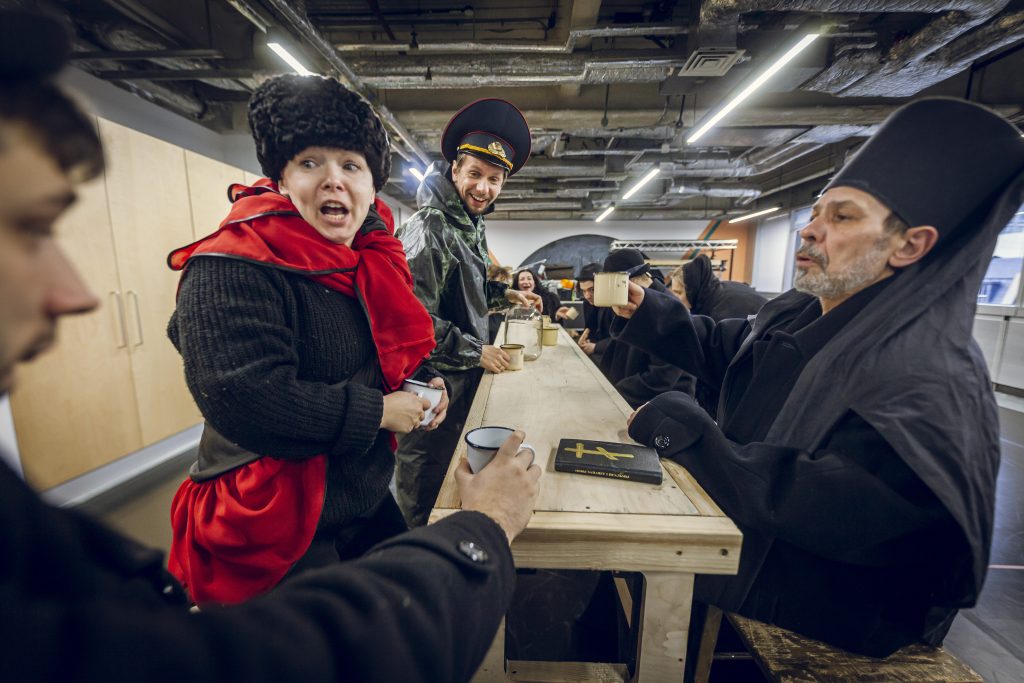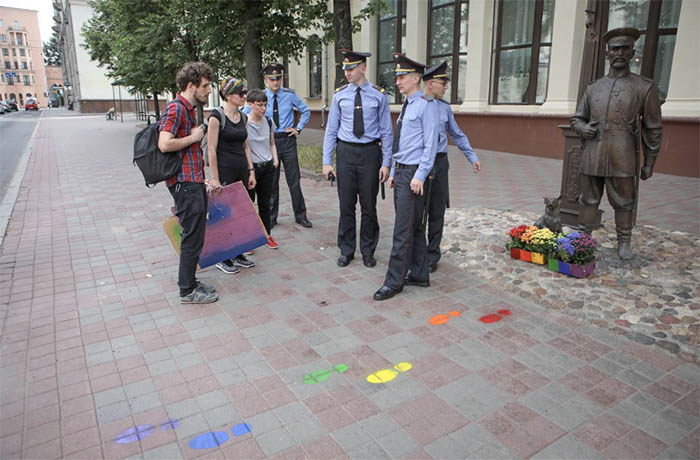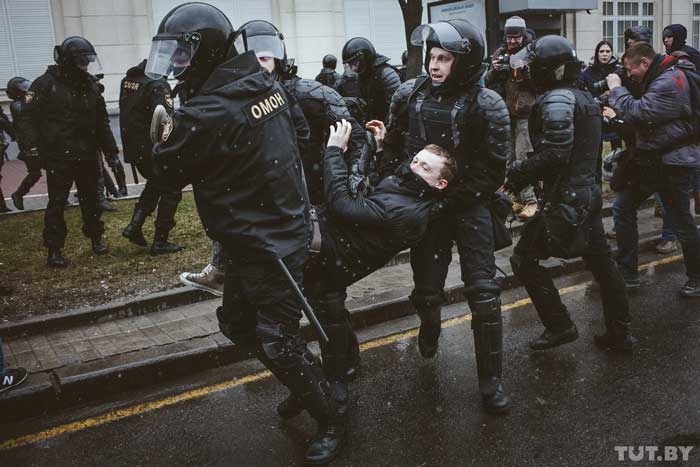5 Aug 2022 | Afghanistan, Belarus, Brazil, Indonesia, Kenya, News and features, Poland, Russia, South Africa, United Kingdom

Belarus Free Theatre’s Dogs of Europe in rehearsal. Photo: Mikalai Kuprych
Index on Censorship has always supported the theatre of resistance, and our Winter 2021 magazine even had this issue as its main theme.
In Belarus, for example, organisations such as Belarus Free Theatre are crucial to fighting Lukashenka’s ruthless regime. Playwrights in Turkey have also faced government censorship throughout history and have to find their way around it.
In the UK, theatre censorship was officially abolished in 1968, putting an end to over 200 years of control by the Lord Chamberlain. Countries like Brazil are also making things harder for the arts and theatre sector through a kind of financial censorship linked to ideological values.
Now, we explore the universe of theatre and censorship, looking back at pieces published in our magazine.
Staging dissent: When a British prime minister was not amused by satire, theatre censorship followed. We revisit plays that riled him, 50 years after the abolition of the state censor
In this piece published in 2018, actor and director Simon Callow revisited the struggle to officially abolish censorship in theatre in the UK, which happened in 1968, after lasting for almost 200 years.
He explains why vigilance is still needed nowadays and writes about other forms of censorship, such as self-censorship.
Theatre Censorship
In August 1980, Anna Tamarchenko wrote a piece about the strict and recurrent censorship in Russian theatre.
She exemplifies her point of view citing Russian plays that only hit the stage years after being written, such as Boris Godunov, first staged in 1870, 45 years after it was published. Alexander Pushkin, its author, had already passed away 30 years earlier.
“Under the Soviet regime censorship has gained new opportunities to exert pressure on theatrical life,” Tamarchenko wrote.
Alternative theatre
In this piece published in 1985, theatre critic Agnieszka Wójcik (pseudonym) dives deeply into the censorship and repression against student theatre in Poland, especially following the introduction of Martial Law in December 1981, when student theatre began to be considered a threat to public order.
“The repressions following December 13 therefore somehow ‘objectively’ defined the status of student theatre as suspect, if not downright illegal. After the banning of NZS (the independent student union) which had taken most student groups under its wing during the Solidarity period, they lost the foundations of their material existence,” Wójcik wrote for Index.
Why the Taliban wanted my brave mother dead…
For the 2021 Winter issue of Index magazine, Associate Editor Mark Frary reported on the play The Boy with Two Hearts, written by Afghan author Hamed Amiri and inspired by his memories of his mother’s campaigns for women’s rights and why they had to leave Afghanistan behind.
“When Hamed Amiri was 10 years old he watched his mother Fariba give a speech in his hometown of Herat, Afghanistan, speaking out for women’s rights and education and against the ruling Taliban. A day later, a mullah gave the order for Fariba’s execution and the family began a gruelling 18-month journey through Europe,” Frary writes.
Testament to the power of theatre as rebellion
In December 2021, critic, columnist and cultural historian Kate Maltby wrote about Belarus Free Theatre’s journey towards performing at the Barbican in London in 2022.
She talked to Nikolai Khalezin, playwright and journalist, and Natalia Koliada, theatre producer. Both founded Belarus Free Theatre in March 2005 and told Index about the rollercoaster they’ve been through after going into exile in order to escape from Lukashenka’s dictatorship.
“Since 2011, Khalezin and Koliada have held political asylum in the UK, a necessity for survival in the face of repeated harassment and imprisonment at the hands of Lukashenka’s regime”, writes Maltby.
Where silence is the greatest fear
Published in December 2021, this piece written by Issa Sikiti da Silva, Index contributing editor based in West Africa, looks at the censorship suffered by Kenyan theatre and how it has dragged under a series of corrupt leaders.
He also investigates the legacy left by colonial Britain in Kenya and how it still impacts theatre in the country.
“There was hope that Jomo Kenyatta’s ascension to the presidency in 1964 would help heal the wounds inflicted by the British and pave the way to tolerance, social justice, freedom and prosperity,” Da Silva writes.
God waits in the wings…ominously
Brazil is also home to its share of theatre censorship and free speech issues. In December 2021, Index’s editorial assistant Guilherme Osinski and former associate editor Mark Seacombe reported on a presidential decree that art must be sacred. They explored how it has affected Brazilian theatres across the country.
Osinski and Seacombe interviewed two Brazilian theatre companies, which shared their thoughts on president Jair Bolsonaro’s approach to art in Brazil, comparing the current situation to when the country faced a bloody dictatorship from 1964 to 1985.
“While the overt and ruthless censorship of the military dictatorship that ended in 1985 is now history, theatre today has to comply with a nebulous concept known as “sacred art” or be starved of public funds”, writes Osinski.
Desegregating the theatre
In August 1985, Professor Stephen Gray wrote for Index and explained how theatre in South Africa was shaped and controlled by the law, before this censorship was eventually relaxed and became less strict.
“Theatre itself is debate, and in South Africa, where sensitive issues ignite like flash-paper, to each show its own controversy,” Gray writes.
Play politics: policing theatre in Indonesia
At the beginning of the 1990s, Indonesia’s government had promised more openness and freedom for theatre companies in the country. However, president Suharto closed the doors on Jakarta’s popular theatre and other plays began to be banned across Indonesia.
Andrea Webster reported on that issue for Index in July 1991, emphasising the ironies between Suharto’s speech for democracy and the bans and curbs on theatres.
“The ban occurred just over a month after President Suharto himself made an Independence Day speech on 17 August where he spoke of ‘openness’ and democracy, where ‘differences of opinion had their place in Indonesian society,’” Webster wrote on the occasion.
Sending out a message in a bottle: Actor Neil Pearson, who shot to international fame as the sexist boss in the Bridget Jones films, talks about book banning and how the fight against theatre censorship still goes on
In June 2019, then editor in chief of Index on Censorship, Rachael Jolley, interviewed actor Neil Pearson about why governments fear books being published and how the fight against theatre censorship still goes on.
Among many things, they discussed self-censorship and the boundaries between a play which is acceptably controversial and unacceptably controversial.
“If you are genuinely against censorship, you have to be evenhanded against censorship. If your idea of freedom of speech is only allowing people to say what you already agree with, then Goebbels would have no problem with that definition of speech,” Pearson told Index.
‘Humpty Dumpty has maybe had the last word…’
One of the biggest names in British theatre recently wrote for Index on Censorship. Sir Tom Stoppard, playwright and screenwriter and whose work covers themes such as human rights, censorship and political freedom, wrote in December 2021 on how the battleship over freedom still lies between the individual and the state.
21 Dec 2021 | Artistic Freedom, Belarus, Magazine, News and features, Volume 50.04 Winter 2021, Volume 50.04 Winter 2021 Extras
In a skyscraper in the heart of the City of London, a surprisingly airy rehearsal space hosts a group of Europe’s boldest theatre-makers.
In the centre of the room, a woman trudges in a circle with the juddering, formal rhythms of a fatigued sergeant-major, a vacuum-cleaner held out before her like a rifle. On the other side of the “stage”, an actor playing a surgeon is operating on a seemingly conscious patient.
Two stage-managers watch from the front: behind an otherwise conventional rehearsal table littered with sound equipment and notes, someone has hung the white-and-red flag, or byel-chyrvona-byely s’tsyah, which has become the emblem of Belarusian resistance to the dictator Alyaksandr Lukashenka.
I spot a souvenir water-bottle from the Human Rights Foundation’s Oslo Freedom Forum. On a small chair at the side of the room, a voice issues from a Zoom video running on a laptop. This is Nikolai Khalezin, founder with his wife Natalia Koliada of the Belarus Free Theatre company, directing a rehearsal over video link.
Virtual rehearsals
Today Khalezin is leading his company by Zoom because he seems to have a cold – and, in the time of Covid, no one can be too careful. But unlike most directors working in London, he has long practised in making theatre remotely. Since 2011, Khalezin and Koliada have held political asylum in the UK, a necessity for survival in the face of repeated harassment and imprisonment at the hands of Lukashenka’s regime.

Nicolai Khalezin (centre) directs rehearsals of Dogs of Europe pre-Covid. Photo: Mikalai Kuprych
Khalezin was a journalist before he became a theatre-maker, working for three independent Belarusian newspapers successively closed as the autocracy tightened its grip. But in all the years in the UK, Khalezin and Koliada have never stopped co-ordinating their theatre company, keeping in close but covert contact with artists on the frontline of Belarusian resistance, who have risked their freedom and even their lives to perform “unregistered” theatre in garages and private homes around their homeland.
Long before the pandemic, directing his actors by video-link had become Khalezin’s norm. Now, given the vicious repression which followed Lukashenka’s attempt to assert himself in August 2020 as the “winner” of a sixth term as president, the rest of the 16-member Belarus Free Theatre, and their families, have fled their native land to reunite in London.
Ostensibly, the artists of the Belarus Free Theatre are now refugees. “What can foundations and activists in the West specifically do to help?” I ask Khalezin, perhaps naively.
“What can you do to help? Imagine 20 people arriving in a new country without a roof, without spare clothes, with nowhere to go – then it becomes quite easy to picture what you can do to help.”
But they are also rehearsing in London as prestigious invited artists, programmed to premiere their latest production at the Barbican Centre in March 2022. Dogs of Europe, first performed in an early version in Minsk in 2019 – crowds of supporters turned up in spite of the fear of arrest – is an adaptation of Alhierd Bacharevic’s mammoth novel set in a dystopic Europe of 2049.
In the book, most of Asia has fallen under a secret-service dominated Russian “reich”, while an ever more fragmented western Europe grapples with a refugee crisis. The title seems to recall W H Auden’s poem on the death of Yeats: “In the nightmare of the dark / All the dogs of Europe bark / And the living nations wait / Each sequestered in its hate.”
The novel was published in 2017, but as a long-term collaborator of Bacharevic, Khalezin first saw a version in 2014 – since then, he says, “it has become closer to our contemporary world even quicker than I had imagined.” He is still working on condensing Bacharevic’s 900 pages into a 150 minute show and on scaling up his company’s flexible rehearsal versions to fit the Barbican Theatre’s 1,162-seat main space.
Not that the Belarus Free Theatre’s audiences have ever been small. Part of the problem of performing for years in secret scratch locations around Minsk has always been the sheer number of people who regularly turn up, hungry for intellectual immediacy. The level of direct intervention by Lukashenka’s thugs has varied on and off – part of any surveillance state’s strategy is always to fuel uncertainty and surprise – but in 2007, for example, the entire company were arrested in the middle of a performance of Edward Bond’s Eleven Vests.
Ironically, Bond’s play for young people explores the abuse of liberty by state institutions, both school and army – the arrests came within three weeks of a summit on political liberty in eastern Europe at which Vaclav Havel had hosted the Belarus Free Theatre at his country home in the Czech Republic.
Theatre on the streets
With the eruption of protests in 2020, however, the theatre company found themselves performing on open streets. “Minsk is full of courtyards,” says Svetlana Sugako, the company’s general manager. “We went on to the streets, and so did everybody else, so there we were, performing to the crowds of protesters, and they were performing back in the form of their protest.”
Sugako discovered the Belarus Free Theatre in 2007, after being taken by a friend to a bar and rolling her eyes at the mere concept of theatre. “I had only seen the official, patriotic stuff – the state produces these long shows of official history and calls it theatre.”
Inside, the company were performing their internationally acclaimed version of Sarah Kane’s 4.48 Psychosis. “It was about suicide, and psychosis, and pain – and the government doesn’t allow us to have plays which show this, because we are supposed to be a perfect society, so officially we don’t have suicide, we don’t have psychosis, we don’t have pain. And it was right up in my face, performed at the bar, just like I’m talking to you now.”
Sugako immediately got involved. Shortly afterwards she was arrested with the group, and when I look at accounts of her imprisonment she has given elsewhere, I read harrowing stories about being humiliated while naked, and forced to listen to male prisoners being raped with objects in the next room. So I don’t press her. But she alludes to that particular stint in prison later in our conversation, when she talks about the experiences of being detained again last year in the aftermath of Lukashenka’s crushing of the courtyard protests.
‘‘It was bad before. But even compared to that first time, now it is hell. There are no human rights outside prison. So imagine what happens inside.”
There are still more than 600 political prisoners in Belarus (Lukashenka, in a recent interview with the BBC, called them “criminals”.) The Belarus Free Theatre have been working with Index on Censorship to smuggle letters from prison and publish them on the Index website as Letters from Lukashenka’s Prisoners.
What feels frustrating, observing the Belarus Free Theatre’s development, is how many times it seems to have dropped from the Western radar over the past few years. Ten years ago, they were a liberal cause célèbre – I first encountered their work at an event at the Young Vic in London hosted by Index on Censorship in 2010, which seemed to have every progressive theatre luminary in attendance.
Many friends have stood firm, including the actor Samuel West and the playwright Sir Tom Stoppard, who also has a long-standing relationship with Index. But often, attention seems to flicker fashionably. Khalezin attributes this in part to the sheer wave of people in crisis globally: “You have people in need from Afghanistan, you have people from Syria – we shouldn’t be competing with each other for help, but our stories should all be reason to look beyond your borders, to build more bridges.”
Far from home
Most of the company – all of whom have hair-raising tales about escaping Belarus – are likely to be based in Poland for the foreseeable future, partly because living in London is more expensive.
Conversely, the infectiously hopeful aspect of the Belarus Free Theatre is its unfettered advertisement for the power of theatre as rebellion. Critical conversations about art as freedom of expression inevitably revolve around the naysayers’ question: “yes, but does it actually change anything?”
For 15 years, Khalezin and Koliada have been bringing people together in a nation whose government goes to extreme lengths to keep people apart. Theatre is shared experience – this much we know – and one of the markers of Lukashenka’s regime is his attempt to deny citizens shared experience.
In October 2020, during the height of the election protests, people were forbidden from gathering in public places in groups of more than three and private gatherings were banned outright. (This supposedly was a health measure – but, as Sugako observes, “Belarus has no coronavirus. Officially. We are a perfect country, remember?”).
Whether gathering people in private spaces, or engaging inquiring minds at a public protest, the Belarus Free Theatre brings people together. And when people come together, things begin to happen.
29 Jun 2018 | Belarus, Campaigns -- Featured, Europe and Central Asia, Statements
[vc_row][vc_column][vc_column_text]

Credit: svaboda.org
Three student activists from Belarus Free Theatre’s Studio Fortinbras school, along with Belapan journalist Andrew Shavlygo, were arrested in Minsk on 28 June after the staging of an artistic stunt as part of a new campaign by the theatre in support of LGBTQ+ rights. The students placed rainbow-coloured flower pots at the foot of a statue of a policeman outside the Ministry of Interior to call out homophobia following an official statement by the ministry that claimed “same-sex relationships are fake”.
Those arrested were held overnight without being told why but upon release were fined for “disobeying police”.
“Index on Censorship urges the authorities in Belarus to release the students immediately and safeguard freedom of expression, including the right to protest,” Joy Hyvarinen, head of advocacy at Index, said.
Activists from the Belarus Free Theatre told RFE/RL’s Belarus Service: “We call on police officers to overcome their prejudice and begin to protect the rights of law-abiding LGBT people, who as taxpayers are funding the ministry,” activists from the Belarus Free Theatre told RFE/RL’s Belarus Service.[/vc_column_text][/vc_column][/vc_row][vc_row][vc_column][vc_basic_grid post_type=”post” max_items=”4″ element_width=”6″ grid_id=”vc_gid:1530541073259-ac8906a0-d9db-5″ taxonomies=”172″][/vc_column][/vc_row]
27 Mar 2017 | Belarus, Campaigns, Campaigns -- Featured, Statements
[vc_row][vc_column][vc_column_text]

Belarusian police detain Belarus Free Theatre’s Siarhai Kvachonok on Saturday March 25 2017 during protests against Presidential Decree No 3, which imposes a tax on unemployed people. (Photo: Tut.by)
Index on Censorship condemns the continued crackdown on protesters in Europe’s last dictatorship.
Belarusian authorities detained about 400 people over the weekend as Freedom Day demonstrations against the country’s Presidential Decree No. 3, which imposes a tax on the unemployed. Protesters were met by riot police and many were reportedly assaulted.
“This is in clear violation of the right to freedom of expression and freedom of assembly. Index demands all detainees be immediately and unconditionally released and all charges be dropped,” Melody Patry, head of advocacy at Index on Censorship, said.
Among the detainees were international and domestic journalists, human rights defenders, and actors and playwrights working for the UK-based Belarus Free Theatre.
BFT staffer, Siarhai Kvachonok was sentenced to 10 days detention on Monday March 27 for his participation in the protest. Among his charges: “Using strong language, shouting and hooliganism”. Yana Rusakevich, another BFT member, was located in a hospital with a concussion on Sunday. On Saturday, BFT manager Svetlana Sugako was filmed being arrested by the BBC.
Artistic Director Natalia Kaliada of the BFT told The Guardian: “It’s a strategy of arrests and clearing the streets and blocking the internet that they think will spook people, but people are very angry. All these arrests and splitting up the crowds might make things a little quieter in Minsk, but now these protests are happening all over Belarus. This is the worst crackdown over the last seven years, but it would have been the biggest protest. People don’t care, they want an end to this dictator. They say ‘basta’ – enough.”[/vc_column_text][/vc_column][/vc_row][vc_row equal_height=”yes” el_class=”text_white” css=”.vc_custom_1490626863780{background-color: #dd3333 !important;background-position: center !important;background-repeat: no-repeat !important;background-size: cover !important;}”][vc_column width=”1/2″][vc_custom_heading text=”Belarus: Mass detentions of journalists at Freedom Day protests” font_container=”tag:p|font_size:28|text_align:left” use_theme_fonts=”yes” link=”url:https%3A%2F%2Fmappingmediafreedom.org%2F%23%2F3877|||”][vc_column_text]Mass detentions of journalists took place in three Belarusian cities during Freedom Day marches, according to the Belorussian Association of Journalists. Over 35 foreign and domestic journalists were detained. Read the full report on Mapping Media Freedom[/vc_column_text][/vc_column][vc_column width=”1/2″ css=”.vc_custom_1490627099721{background-image: url(https://www.indexoncensorship.org/wp-content/uploads/2017/02/MMF_report_2016_cover.jpg?id=85855) !important;background-position: center !important;background-repeat: no-repeat !important;background-size: cover !important;}”][/vc_column][/vc_row][vc_row][vc_column][vc_basic_grid post_type=”post” max_items=”4″ element_width=”6″ grid_id=”vc_gid:1490626915933-142b19eb-1c90-10″ taxonomies=”172, 7379, 301″][/vc_column][/vc_row]




